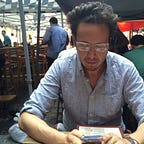Forgiving the Forces that Shape Us
From 2004–2009, a group behavioral geneticists came up with this framework of two “forces” to describe how our genetics interact with our environment, and vice versa. I think they’re sort of cool since both forces bring up interesting ideas about how nature and nurture can shape us, and what role we can have in this process.
One way we could interact with the world is through “Evocative Forces,” which are basically our innate personality triggering responses from the world around us… activating reactions from others that in turn shape who we are, and become. So you might have been an innately troublesome kid and so received pretty authoritarian parenting. (Sorry to hear that by the way.) You might’ve been a bookworm and so were often left alone by caregivers, and maybe friendless. And in interacting with someone like me, who is sort of intense and philosophical at times like this, your genetic predisposition might guide your reaction to this Facebook post. “Like” or “Wow.” Maybe even “Sad.” And that would continue to shape me. Maybe I’d even stop writing rants on Facebook. Start a blog so I can be ignored over there instead.
Alternatively you could select everything based entirely on your genetics, others be damned. These “Active Forces” guide a kid who is genetically coordinated toward playing basketball, for example. No one said he’d be good at it or should try it out, it’s not about how others react at all. Or maybe you have a sharp eye, began to draw naturally when you were young and then, years later, boom, you’re an artist. Hell, maybe you’re sly and great at stealing. In this case your genetics are straight-up driving you to it, sort of like discovering your dominant hand and watching it grow even more dominant with use. Thus, even without trying, active forces draw us closer toward who we were predisposed to be all the time. Game over.
I bring these two forces up because I’ve been thinking a lot lately about how much of where we are right now, in society and in the span of human development, was really even caused by our choices. We can’t necessarily control anything around us, or any outcomes for that matter, and so I’m starting to consider that it’s worth taking just a little pressure off us all as well — free ourselves (literally everyone around us) from the idea that we are responsible for bad things, or tough times, when they happen.
I wonder now if we could have collectively evoked the many responses that led to these trying times. Or if maybe we could have been actively choosing them, but based on what we thought worked best, those innate feelings that turned out to be mistaken. If either of these fates were possible, are the many difficulty in the works really even our “faults,” per se? Seems sort of like blaming the last domino on the first one, for incidentally getting knocked over; blame really has no place in this.
I think the only way to be free of a dynamic that doesn’t work is to notice it: wonder what triggered that first domino to fall in the first place, basically. Wonder, as long as we have to, why we are triggered to react at all. And since we have no control over others and how these forces might drive them, we also have no choice here except to look in the mirror, and ask about how our own genetics might have predisposed us to this place in the history of time, where people are in fear of deportation, environmental disasters, racism, abuses of power… all maybe fated to come together now all along, and be reckoned with in each of us, one by one.
Maybe we can first forgive the millions of years of genetic predisposition that brought us here too — we were just following our genetic guides, we didn’t know what we were doing, we swear! — so that we can move forward more thoughtfully, and maybe even with a little compassion for mistakes, yes others’ mistakes but especially for our own.
After all, wouldn’t a guy free to make decisions against his genetic makeup probably choose be nicer to himself? Most especially if it feels MUCH harder than blaming and self-criticizing? (We’re talking about defying our genetic propensities here… doing it was never going to be easy.)
Thanks for reading and forgive my long post, too. Something forced it out.
